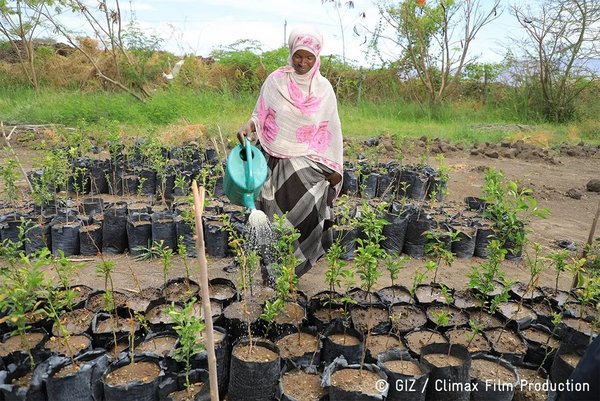 Read this article in French
Read this article in French- Share this article
- Subscribe to our newsletter
CompensActION aims to reward farmers for climate performance
Around 84 per cent of all farms world-wide are smaller than two hectares. A large proportion of these are run by smallholders in partner countries. They make a significant contribution to preserving ecosystems. According to estimates, at least one-third of family farms follow agroecological principles in whole or in part. They should be adequately compensated for services such as these. This requires compensation mechanisms that combine income from agricultural production with a payment for positive externalities. This is where CompensACTION comes in.
CompensACTION was launched in July 2022, under the German G7 Presidency by the German Federal Ministry for Economic Cooperation and Development (BMZ) as part of the Working Group on Food Security. It is implemented by Deutsche Gesellschaft für Internationale Zusammenarbeit (GIZ) GmbH, together with its partner CLIMEAT.
The initiative aims to promote so-called Payment for Ecosystem Services (PES) innovations on a large scale. These can include CO2 storage, water and soil conservation, biodiversity protection and other activities for which farmers are rewarded. Some of this already exists in the European Common Agricultural Policy. A strip of old grass, a late-mown meadow or supplementary flowering strips lead to higher subsidies in Germany.
CompensACTION plans to increase the income of small farmers in low- and middle-income countries as well. To achieve this, the initiative has already started the first pilot projects with support from the International Fund for Agricultural Development (IFAD).
Pilot projects in Ethiopia, Brazil, and Lesotho
In Ethiopia, CompensACTION is promoting agroforestry. The project aims to introduce sustainable agricultural practices on 25,000 hectares of land that sequester at least 2.2 tons of CO2 equivalent, a bundle of different greenhouse gases, per hectare per year. In addition, more than 8,000 households are to increase their income by trading carbon credits. CompensACTION also provides incentives for nature- and climate-positive agriculture in Lesotho and Brazil.
In Brazil, it supports the establishment of a financing system for deforestation-free value chains. In the first step, a partner organisation of IFAD identifies relevant ecosystem services. In the next step, it develops the mechanisms to reward smallholder farmers for these services. CompensACTION plans to work with 1,500 families to sustainably manage about 10,000 hectares of forest land, starting in 2024.
In Lesotho, there is a national fund for payment for ecosystem services (water efficiency, biodiversity promotion/conservation, carbon abatement/sequestration). This is expected to reach up to 40,000 people and is designed to continue beyond the life of the project.
The CompensACTION initiative disseminates experiences from another BMZ-funded pilot: refinancing a system of agricultural extension services for 30,000 farmer families by introducing agroecological practices in western Kenya (on 11,000 ha, each with 3.6 tons CO2 equivalent/ha/year).
Curious? Looking for support or exchange regarding similar projects? CompensACTION is open to collaborating to implement projects and sharing ideas about compensation mechanisms. We look forward to hearing from you (compensaction@giz.de).
(giz/wi)
More information:
Link to Compensaction





Add a comment
Comments :
Application as a Collaborator in the Commodity value Chain Carbon Offset Projects in Nigeria
I write to indicate my interest as a Representative / Partner of your Organization in Carbon Offset Projects for commodity crops production in Nigeria to develop and finance quality carbon offset projects by supporting, screening, planning, developing, and managing GHG emission reduction projects in production of commodity crops in Nigeria. Please permit me to reiterate the position of Nigeria as an important producers of globally important agricultural crops such as (ginger, maize, cowpea, cassava, oil palm produce, cocoa) and the relevance of my qualifications and experiences which have culminated in my ability to analyze large socio - ecological data for management of environmental challenges related to sustainable crops production, food, energy and water security, climate change - mitigation and adaptation and biodiversity conservation.
I hold a Bachelor of Agriculture (Agricultural Economics); MSc Environmental Control and Management and PhD (Environmental Analysis and Modelling)]. Where my PhD research thesis was on Assessment of Spatio Temporal Dynamics of Agricultural Land Use and Land Use Change in Malaysia using Dyna - CLUE Model. My research on the application of landscape metrics for assessing sustainability of globally traded agricultural commodity (Ginger) in Southern Kaduna of Nigeria” which was presented at the summer school training themed “ImPlementing Landscape Ecology for Improved SustAinability and Societal Equity of Social – Ecological Systems in Sub – Saharan Africa (PLEASE – SES)” sponsored by The Volkswagen Foundation in collaboration with Makerere University, Uganda is an indication of my knowledge of impact of international trade and environmental policy on land use and ecosystem change.
I have over three years’ experience in the development of Clean Development Mechanisms (CDM), Verified Carbon Standard (VCS) and Gold Standard rules, criteria, framework, methodologies in my engagement as a Technical Advisor to the VERRA Agricultural Land Management Working Group and this experience would be useful in supporting my preparation of relevant documentation and reports on GHG emission reduction standards and methodologies. Moreso, I have experience as a monitoring and evaluation consultant to a Germany – based Company in an ongoing mangrove restoration project in the Niger Delta region of Nigeria as a nature - based solution (REDD+, Afforestation, Reforestation, Restoration) and this has equipped me with practical experience in community - based sustainable forest management for mitigating and adapting to climate change and achieving conservation of natural resources for carbon capture, utilization, storage (CCUS), carbon credit, biodiversity, healthy food, timber, water production and livelihood improvement.
I am also an academic and research staff of the Department of Environmental Management of the Kaduna State University where my teaching and research interests are on Regenerative / Conservation Agriculture; Sustainable Agricultural Land Management; Climate Smart Agriculture and Carbon Offset Projects in Commercial Production of Commodity Crops.
I will be glad to receive your kind consideration of my application very shortly.
Yours Faithfully,
Akeem Olawale OLANIYI (PhD)